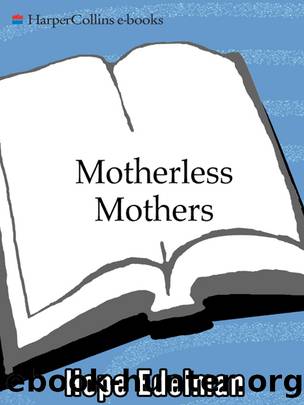Motherless Mothers by Hope Edelman

Author:Hope Edelman
Language: eng
Format: epub
Publisher: HarperCollins
The detailed story of my mother’s illness goes something like this: an ob/gyn felt a lump in her left breast in 1979, but assured her it was only a cyst. My mother knew she should have it drained or removed, but didn’t think there was a reason to rush. Or maybe she was scared. That’s the part I don’t know. What’s certain is that by the time another ob/gyn felt the same lump a year later and sent her straight to a radiologist, the tumor was three centimeters wide and had spread beyond the breast. She had a radical mastectomy, followed by chemotherapy, but there was never any chance for a cure. Years later, her oncologist told me that from the start, the hope was only to extend her life for as long as possible. He managed to keep her alive for sixteen months. By then, the cancer had spread throughout her body. When it reached her liver she ran out of time.
The abridged version I tell my daughters goes more like this: My mom got sick, but she didn’t go to the doctor right away. Then she went to the doctor and found out she had something called breast cancer. And then she got very, very sick, and she died. But that won’t happen to me, because whenever I get sick I go straight to the doctor. So if I ever get what she had, the doctor will find it right away, and I’ll get it fixed and, hopefully, I’ll be able to live for a very long time.
It’s a good start, Dan Schaefer says, but it could use some work. “You can also say, ‘When my mother was alive, they didn’t have the medicine they have today. Now, they have the right medicine,’” he suggests. “Also, ‘a long time’ for children is confusing. Say, ‘I don’t expect to die until you’re old and married and have children.’ It puts it in better perspective for them.”
Where is the proper balancing point here, that perfect sweet spot between hope and truth? I don’t want to tell my daughters fables designed only to reassure them, but I don’t want to overwhelm them, either, with frightening details. Is my loyalty to their emotional security, or to historical fact? Most mothers would say the former, I imagine, but it’s not so clear-cut to me. My assurances need to feel authentic to me, too. Promising my children that I’ll live a long life might calm their anxiety for the moment, but it’s not a guarantee I can offer in good conscience, knowing firsthand how hard it can be for a mother to honor. I’m reluctant to tell my daughters that I’ll live to see their children—not because I expect to die before then, but because an even greater betrayal than dying when they’re young, I believe, would be for me to make such a promise and then fail to keep it.
So I hedge. I sidestep. I offer other certainties. I say, “I know it happened to Grandma, but I’ll do everything I can to make sure I live till you’re grown.
Download
This site does not store any files on its server. We only index and link to content provided by other sites. Please contact the content providers to delete copyright contents if any and email us, we'll remove relevant links or contents immediately.
They Both Die at the End by Adam Silvera(8609)
Thirteen Reasons Why by Jay Asher(7786)
The Space Between by Michelle L. Teichman(6085)
Suicide Notes by Michael Thomas Ford(4271)
Tuesdays with Morrie by Mitch Albom(3832)
Suicide: A Study in Sociology by Emile Durkheim(2609)
The Checklist Manifesto by Atul Gawande(2202)
Tuesdays With Morrie by Mitch Albom(2170)
Robin by Dave Itzkoff(2005)
In the Woods by Tana French(1996)
Bossypants by Tina Fey(1985)
No Ashes in the Fire by Darnell L Moore(1980)
Reservoir 13 by Jon McGregor(1851)
End of Days by Sylvia Browne(1821)
Olive Kitteridge by Elizabeth Strout(1789)
Bus on Jaffa Road by Mike Kelly(1782)
All Things New by John Eldredge(1780)
Scar Tissue by Anthony Kiedis(1767)
No Time to Say Goodbye(1757)
